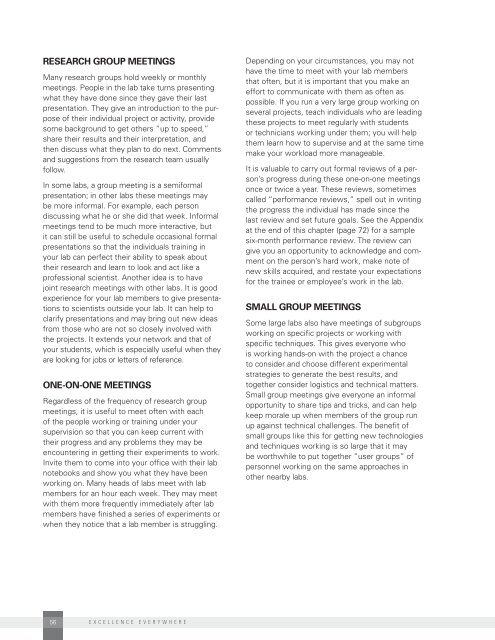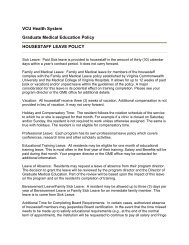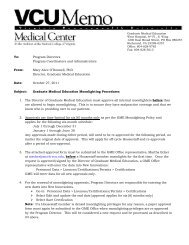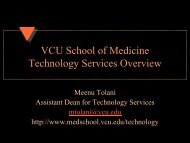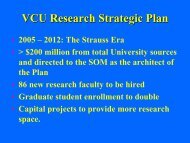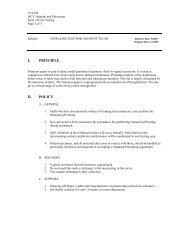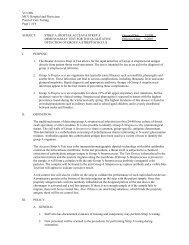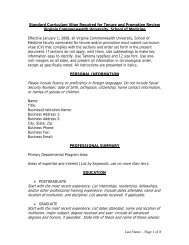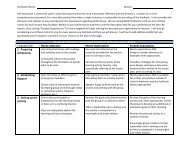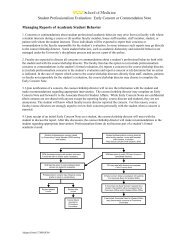Excellence Everywhere - National University of Ireland, Galway
Excellence Everywhere - National University of Ireland, Galway
Excellence Everywhere - National University of Ireland, Galway
- No tags were found...
You also want an ePaper? Increase the reach of your titles
YUMPU automatically turns print PDFs into web optimized ePapers that Google loves.
Research group meetingsMany research groups hold weekly or monthlymeetings. People in the lab take turns presentingwhat they have done since they gave their lastpresentation. They give an introduction to the purpose<strong>of</strong> their individual project or activity, providesome background to get others “up to speed,”share their results and their interpretation, andthen discuss what they plan to do next. Commentsand suggestions from the research team usuallyfollow.In some labs, a group meeting is a semiformalpresentation; in other labs these meetings maybe more informal. For example, each persondiscussing what he or she did that week. Informalmeetings tend to be much more interactive, butit can still be useful to schedule occasional formalpresentations so that the individuals training inyour lab can perfect their ability to speak abouttheir research and learn to look and act like apr<strong>of</strong>essional scientist. Another idea is to havejoint research meetings with other labs. It is goodexperience for your lab members to give presentationsto scientists outside your lab. It can help toclarify presentations and may bring out new ideasfrom those who are not so closely involved withthe projects. It extends your network and that <strong>of</strong>your students, which is especially useful when theyare looking for jobs or letters <strong>of</strong> reference.One-on-one meetingsRegardless <strong>of</strong> the frequency <strong>of</strong> research groupmeetings, it is useful to meet <strong>of</strong>ten with each<strong>of</strong> the people working or training under yoursupervision so that you can keep current withtheir progress and any problems they may beencountering in getting their experiments to work.Invite them to come into your <strong>of</strong>fice with their labnotebooks and show you what they have beenworking on. Many heads <strong>of</strong> labs meet with labmembers for an hour each week. They may meetwith them more frequently immediately after labmembers have finished a series <strong>of</strong> experiments orwhen they notice that a lab member is struggling.Depending on your circumstances, you may nothave the time to meet with your lab membersthat <strong>of</strong>ten, but it is important that you make aneffort to communicate with them as <strong>of</strong>ten aspossible. If you run a very large group working onseveral projects, teach individuals who are leadingthese projects to meet regularly with studentsor technicians working under them; you will helpthem learn how to supervise and at the same timemake your workload more manageable.It is valuable to carry out formal reviews <strong>of</strong> a person’sprogress during these one-on-one meetingsonce or twice a year. These reviews, sometimescalled “performance reviews,” spell out in writingthe progress the individual has made since thelast review and set future goals. See the Appendixat the end <strong>of</strong> this chapter (page 72) for a samplesix-month performance review. The review cangive you an opportunity to acknowledge and commenton the person’s hard work, make note <strong>of</strong>new skills acquired, and restate your expectationsfor the trainee or employee’s work in the lab.Small group meetingsSome large labs also have meetings <strong>of</strong> subgroupsworking on specific projects or working withspecific techniques. This gives everyone whois working hands-on with the project a chanceto consider and choose different experimentalstrategies to generate the best results, andtogether consider logistics and technical matters.Small group meetings give everyone an informalopportunity to share tips and tricks, and can helpkeep morale up when members <strong>of</strong> the group runup against technical challenges. The benefit <strong>of</strong>small groups like this for getting new technologiesand techniques working is so large that it maybe worthwhile to put together “user groups” <strong>of</strong>personnel working on the same approaches inother nearby labs.56 excellence everywhere


